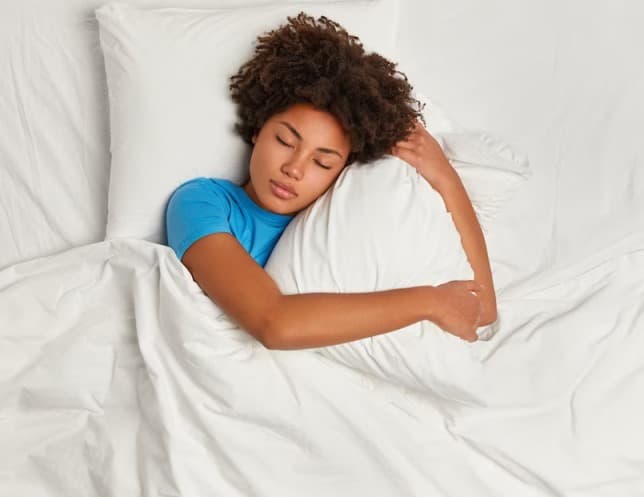Sleep is essential for our overall well-being, allowing our bodies and minds to rejuvenate and recharge. However, there are times when our sleep can be disrupted by unexpected occurrences, such as sweating excessively around the neck area.
Elevated body temperature due to fevers and various underlying health issues can result in nighttime perspiration affecting both the head and neck regions. Women experiencing menopause and men with low testosterone levels may encounter this phenomenon.
In this article, we will discover the reasons behind nighttime neck sweat and learn effective solutions to manage it.
Why Does My Neck Sweat When I Sleep?
Experiencing sweating around neck at night can be uncomfortable and perplexing. To understand why this happens, we need to delve into the underlying causes. Here are some possible explanations:
1. Temperature Regulation
Our bodies have a natural mechanism to regulate temperature, ensuring optimal comfort during sleep. Sweating is one way the body cools itself down when it becomes too hot.
The neck is a particularly sensitive area, and when the body senses an increase in temperature, it may respond by activating sweat glands in the neck region, leading to sweating.
2. Hormonal Imbalances
Hormones play a vital role in maintaining equilibrium within our bodies. Fluctuations in hormone levels can disrupt the body’s thermoregulatory system, resulting in excessive sweating, including around the neck area.
Hormonal imbalances, such as those experienced during menopause or certain medical conditions, can contribute to night sweats.
3. Anxiety and Stress
The mind-body connection is a powerful phenomenon. Anxiety and stress can trigger physiological responses in the body, including increased sweating.
When we experience heightened emotional states during sleep, such as anxiety or stress-related dreams, the body may react by producing excess sweat, which can manifest around the neck.
4. Environmental Factors
The environment in which we sleep can significantly impact our comfort levels and how our bodies respond. Factors such as room temperature, humidity, and bedding materials can influence sweating during sleep.
Sleeping in a warm room or using heavy blankets that trap heat can cause the neck to sweat.
5. Medications and Medical Conditions
Certain medications and medical conditions can induce night sweats, including sweating around the neck area. Examples include antidepressants, hormone therapies, infections, and conditions like hyperhidrosis.
If you suspect medication or an underlying medical condition as the cause of your neck sweat during sleep, it is advisable to consult a healthcare professional for further evaluation.
Read Also: Spring Asthenia – What it is and how to overcome it
How Can I Manage Neck Sweat When I Sleep?
Managing neck sweat when you sleep involves a combination of preventative measures, sleep environment adjustments, and self-care routines.
Choosing the Right Bedding
Selecting the right bedding materials can make a world of difference. Opt for breathable, moisture-wicking fabrics such as cotton or bamboo. These materials help regulate body temperature and wick away excess moisture, keeping you cool and dry throughout the night.
Elevate Your Head
Using an extra pillow to slightly elevate your head can promote air circulation around your neck area, reducing the chances of sweat buildup. This simple trick can be especially beneficial during hot summer nights.
Maintain a Cool Bedroom
Keeping the bedroom at a temperate temperature might lessen excessive perspiration. To create a cozy sleeping space, use a fan or air conditioner.
Hydrate Wisely
Staying hydrated is important, but avoid consuming large amounts of fluids close to bedtime. This can help reduce the likelihood of excessive sweating during the night.
Shower Before Bed
Taking a refreshing shower before bedtime not only cleanses your skin but also helps lower your body temperature, minimizing the potential for night sweats.
Choose Breathable Sleepwear
Opt for loose-fitting, breathable pajamas made from natural fabrics like cotton. This allows air to circulate freely, preventing sweat buildup.
Natural Remedies
Certain natural remedies, such as aloe vera gel or chamomile, can have a soothing effect on the skin and help reduce sweat. Apply a small amount to your neck before sleep.
Adjust Your Sleeping Position
Experiment with different sleeping positions to find one that minimizes contact between your neck and the pillow. This can help reduce sweat accumulation.
Humidity Control
Use a dehumidifier in your bedroom to maintain optimal humidity levels. High humidity can contribute to excessive sweating.
Stay Stress-Free
Stress and anxiety can lead to increased sweating. Practice relaxation techniques such as deep breathing or meditation to keep stress at bay.
Avoid Spicy Foods
Spicy foods can raise your body temperature and lead to increased sweating. It’s best to avoid them, especially in the evening.
Stay Consistent
Consistency is key to managing neck sweat. Make these strategies part of your nightly routine for the best results.
Conclusion
Experiencing neck sweat during sleep can be a puzzling and uncomfortable occurrence. By understanding the possible causes behind it, such as temperature regulation, hormonal imbalances, anxiety and stress, environmental factors, medications, and medical conditions, you can take appropriate steps to manage and minimize night sweats.
If your neck sweat during sleep persists or is accompanied by other concerning symptoms, seeking medical advice is advisable. Prioritizing a comfortable sleep environment, adopting healthy sleep practices, and managing stress levels can contribute to more restful nights free from excessive neck sweating.
